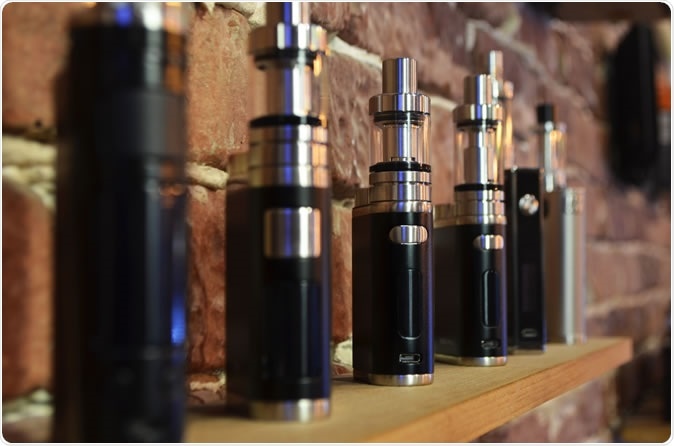A new study from Penn State College of Medicine researchers has shown that different electronic cigarettes or “electronic nicotine delivery system (ENDS)” have different rates of nicotine delivery to the users. Most popular brand of e-cigarettes JUUL for example has been found to deliver more nicotine at a faster rate compared to other brands. The study titled, “Nicotine Absorption Profile Among Regular Users of a Pod-Based Electronic Nicotine Delivery System” was published in the latest issue of the journal JAMA Open Network.

Electronic cigarettes. Image Credit: Nicat Nasibli / Shutterstock
Jessica Yingst, first author of the study and researcher at institute explained that there have been studies that have revealed that electronic cigarettes with cartridges containing higher nicotine concentrations were also providing low nicotine to the users compared to traditional cigarettes. In order to prove the exact nicotine delivery capacity of these e-cigs the team thus looked at the nicotine delivery capacity of JUUL and other brands. JUUL is said to contain highest nicotine concentration in its pods, says Yingst.
For this study the team of researchers recruited six users of JUUL recruited between from November 2018 to May 2019, and they were asked to puff on their devices for ten minutes at intervals of 20 seconds. A total of 30 puffs were thus recorded. The blood samples for testing nicotine levels were calculated before the vaping, during and after the vaping. To detect the amount of nicotine in the blood of the participants, the team used liquid chromatography and mass spectrometry (LCMS).
Yingst said, “The JUUL users we studied obtained blood nicotine concentrations almost three times as high as most of the e-cigarette users we previously studied. JUUL's nicotine delivery is very similar to that of cigarettes.” JUUL nicotine pods also contained highest nicotine at 59 mg/mL, say researchers. Results revealed, “Among experienced users who took 30 puffs in 10 minutes, the pod-based ENDS delivered a mean nicotine boost of 28.6 ng/mL in a mean of 8.7 minutes.”
In addition to the nicotine levels the team also asked the participants about craving, withdrawal symptoms and anxiety levels before and after vaping. To detect their addiction levels they also took the Penn State Electronic Cigarette Dependence Index questionnaire. Results revealed that these JUUL users had higher nicotine dependence based on their self-assessed questionnaire. Their use and dependence was compared with 3000 long term users of other brands of e cigarettes. In addition anxiety levels were lowered after vaping with JUUL wrote the researchers.
Co-author of the study, Jonathan Foulds, a professor of public health sciences, explained that these results were different from the earlier studies that tried to say that e-cigarettes were less addictive than regular cigarettes. He said, “In previous studies, we found that e-cigarette users were less addicted than smokers. However, the high nicotine delivery of the product and the scores on this study suggest that JUUL is probably as addictive as cigarettes.”
Authors wrote, “This study is the first, to our knowledge, to show that JUUL delivers a higher and faster boost in blood nicotine than has been reported for most other ENDS devices.” They added, “Compared with studies reporting the nicotine boost obtained after smoking 1 cigarette, this product’s nicotine delivery was similar. The nicotine delivery capabilities of this ENDS device may contribute to its addictiveness as well as its ability to compete with cigarettes for market share.”
The authors of the study recommend that non-smokers should not begin smoking e-cigarettes because they can be quite addictive. Smokers of regular cigarettes however can switch to less addictive and less nicotine delivering e-cigarettes. Another co-author of the study, John Richie, professor of public health sciences at the College of Medicine said, “In previous work, we determined that JUUL delivered lower levels of some harmful chemicals than cigarettes and even some other e-cigarettes.”
Foulds however warned that JUUL and some of the brands of e-cigarettes could be harmful for health. He said, “This type of product is likely addictive and is attractive to teenagers. But those same qualities that make it addictive may enable it to help adult smokers switch to a much less harmful form of nicotine consumption.”
His words were similar to the findings reported last month in the Journal Paediatrics that said that more and more teenagers were getting addicted to vaping because of the wide range of candy and fruity flavours offered to them. Researchers from University of Southern California had blamed these flavoured cartridges for the vaping epidemic among teenagers and called for stricter regulations against these.
Journal reference:
Yingst JM, Hrabovsky S, Hobkirk A, Trushin N, Richie JP, Foulds J. Nicotine Absorption Profile Among Regular Users of a Pod-Based Electronic Nicotine Delivery System. JAMA Netw Open. 2019;2(11):e1915494. doi: https://doi.org/10.1001/jamanetworkopen.2019.15494